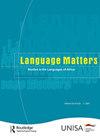Revitalisation of the Tonga Language in Zimbabwe: The Motivational Factors
IF 0.8
3区 文学
0 LANGUAGE & LINGUISTICS
引用次数: 7
Abstract
Abstract This article investigates the motivation behind the Tonga people’s initiation of the language revitalisation process. It is based on research conducted in the Binga District, which was the epicentre of the Tonga language revitalisation project in the Zambezi Valley. The participants in the study were purposively sampled from various stakeholders in the project, inter alia, traditional chiefs, officials from the education sector, former and serving employees of NGOs, members of the Tonga Language and Culture Committee (TOLACCO) and Chairpersons of the Zimbabwe Indigenous Languages Promotion Association (ZILPA). The article identifies a number of socio-cultural and religious factors that motivated and propelled the Tonga people to embark on a project of language revitalisation. Within the theoretical framework of Human Needs Theory, the article critically analyses how these factors motivated the Tonga community to embark upon their language revitalisation initiative.汤加语在津巴布韦的复兴:激励因素
摘要本文探讨了汤加人民启动语言振兴进程的动机。它基于在宾加区进行的研究,宾加区是赞比西河谷汤加语复兴项目的中心。该研究的参与者有意从该项目的各个利益攸关方中抽取,其中包括传统酋长、教育部门官员、非政府组织的前任和现任雇员、汤加语言和文化委员会成员以及津巴布韦土著语言促进协会主席。这篇文章指出了一些社会文化和宗教因素,这些因素激励和推动汤加人民开展语言振兴项目。在人类需求理论的理论框架内,本文批判性地分析了这些因素是如何促使汤加社区开始他们的语言振兴倡议的。
本文章由计算机程序翻译,如有差异,请以英文原文为准。
求助全文
约1分钟内获得全文
求助全文
来源期刊

Language Matters
Multiple-
CiteScore
1.20
自引率
0.00%
发文量
19
期刊介绍:
The purpose of Language Matters is to provide a journal of international standing with a unique African flavour focusing on multilingualism in Africa. Although the journal contributes to the language debate on all African languages, sub-Saharan Africa and issues related to multilingualism in the southern African context are the journal’s specific domains. The journal seeks to promote the dissemination of ideas, points of view, teaching strategies and research on different aspects of African languages, providing a forum for discussion on the whole spectrum of language usage and debate in Africa. The journal endorses a multidisciplinary approach to the study of language and welcomes contributions not only from sociolinguists, psycholinguists and the like, but also from educationalists, language practitioners, computer analysts, engineers or scholars with a genuine interest in and contribution to the study of language. All contributions are critically reviewed by at least two referees. Although the general focus remains on multilingualism and related issues, one of the three issues of Language Matters published each year is a special thematic edition on Language Politics in Africa. These special issues embrace a wide spectrum of language matters of current relevance in Southern Africa.
 求助内容:
求助内容: 应助结果提醒方式:
应助结果提醒方式:


